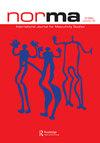Masculine borders as alienation of racialized, undocumented south Asian migrant workers in Greece
IF 1.5
Q2 SOCIOLOGY
引用次数: 0
Abstract
ABSTRACTBangladeshi, Indian, and Pakistani low-class male migrants in Greece are marked by migrant precarity due to their undocumented status and by a flattened South Asian racialised masculine identity. Collectively othered, they struggle with symbolic borders created by colonial and postcolonial encounters, national identities, religion, and masculine expectations. This article explores how ideologies of prejudice and divisiveness in Greece work in tandem with articulations of othering and national (un)belonging from the men’s home countries to define both their interpersonal relationships and labour outcomes in Greece. It proposes the concept of ‘masculine borders’ to describe processes through which culturally specific masculinities of South Asian men are (re)produced or reconfigured relationally and hierarchically to each other by the capitalist project with the aim of alienating and discipling workers. With such everyday bordering discourses, a novel articulation of Marxian alienation of workers from each other emerges. In this case, masculine norms mesh with Islamophobia and racism to thicken masculine borders between Bangladeshi, Pakistani, and Indian men, assisting in the efficient accumulation of surplus by the capitalist class.KEYWORDS: Greeceborderingracismalienation of labourmasculine borders AcknowledgementsI am grateful to Ardis Ingvars for proposing a seminar on bordering regimes and masculinities in transition of racialized migrant men in Reykjavik and the Department of Sociology, University of Iceland, and RIKK-Institute for Gender, Equality and Difference for hosting it. Thanks to the working group of the special issue for their thoughtful questions and insights and to Paritosh Kumar, Angela Pietrobon, Laddu and two anonymous reviewers for their helpful comments on earlier drafts of this paper. I would also like to thank all the migrant men who took valuable time out of their work to share their life stories with me.Disclosure statementNo potential conflict of interest was reported by the author(s).Notes1 Alienation is also evident in the gig economy, where the very nature of platform work and labour control isolates workers from each other and thus creates powerlessness; see Glavin, Bierman, and Schieman (Citation2021) for details.Additional informationFundingThis work was funded by SSHRC Insight Development Grant, award no 430-2020-00040, the Fund for Scholarly Research and Creative Work and Professional Development (Adjuncts), and SSHRC Institutional Grant, Queen’s University in Kingston, Canada.Notes on contributorsReena KukrejaReena Kukreja is Assistant Professor in the Department of Global Development Studies at Queen’s University. She is cross-appointed to the Department of Gender Studies and the Cultural Studies Program at Queen’s University. She divides time between teaching, research, and filmmaking. She has published in journals such as Geoforum, Gender & Society, Journal of Ethnic and Migration Studies, Men & Masculinities, Modern Asian Studies, and the Journal of Intercultural Studies. Her monograph on marriage migration in India, Why Would I Be Married Here? Marriage Migration and Dispossession in Neoliberal India was published by Cornell University Press in April 2022. Her research interests include migration and development, marriage migration, South Asian masculinities, political economy, caste, and trafficking. Currently, her work examines the intersections of masculinity, sexuality, securitisation of borders and religious fundamentalism on the lives of undocumented South Asian men in Greece.男性边界是对希腊种族化、无证件的南亚移民工人的异化
【摘要】在希腊的孟加拉国、印度和巴基斯坦的低阶级男性移民,由于他们的无证身份和扁平化的南亚种族化男性身份,其特点是移民不稳定。总的来说,他们与殖民和后殖民相遇、民族身份、宗教和男性期望所创造的象征性边界作斗争。本文探讨了希腊的偏见和分裂意识形态如何与来自男性母国的其他和国家(un)归属的表达一起工作,以定义他们在希腊的人际关系和劳动成果。它提出了“男性边界”的概念来描述在资本主义项目中,南亚男性在文化上特定的男性气质被(重新)生产或重新配置,彼此之间的关系和等级关系,目的是疏远和约束工人。在这种日常的边界话语中,马克思主义对工人彼此异化的一种新颖的表达出现了。在这种情况下,男性化规范与伊斯兰恐惧症和种族主义相结合,使孟加拉国、巴基斯坦和印度男性之间的男性化界限变得更厚,从而帮助资产阶级有效地积累剩余。感谢阿迪斯·英瓦尔斯(Ardis Ingvars)提议在雷克雅未克举办一场关于边界制度和种族化移民男性转型中的男性特征的研讨会,并感谢冰岛大学社会学系和rikk——性别、平等与差异研究所主办该研讨会。感谢特刊工作组提出的深思熟虑的问题和见解,感谢Paritosh Kumar、Angela Pietrobon、Laddu和两位匿名审稿人对本文早期草稿的有益评论。我还要感谢所有从工作中抽出宝贵时间与我分享他们生活故事的男移民。披露声明作者未报告潜在的利益冲突。注1:在零工经济中,异化也很明显,平台工作和劳动控制的本质将工人彼此隔离,从而造成无力感;详情见Glavin, Bierman和Schieman (Citation2021)。本研究由SSHRC洞察力发展基金(编号430-2020-00040)、学术研究、创造性工作和专业发展基金(兼职)以及加拿大金斯敦女王大学SSHRC机构基金资助。作者简介:reena Kukreja,女王大学全球发展研究系助理教授。她被女王大学性别研究系和文化研究项目交叉任命。她把时间分别用于教学、研究和电影制作。她曾在《地理论坛》、《性别与社会》、《种族与移民研究》、《男性与男子气概》、《现代亚洲研究》和《跨文化研究》等期刊上发表文章。她关于印度婚姻移民的专著《为什么我会在这里结婚?》《新自由主义印度的婚姻、移民和剥夺》于2022年4月由康奈尔大学出版社出版。她的研究兴趣包括移民与发展、婚姻移民、南亚男性、政治经济、种姓和人口贩卖。目前,她的作品探讨了阳刚之气、性、边界证券化和宗教原教旨主义对希腊无证南亚男性生活的影响。
本文章由计算机程序翻译,如有差异,请以英文原文为准。
求助全文
约1分钟内获得全文
求助全文
来源期刊

NORMA
Social Sciences-Gender Studies
CiteScore
3.00
自引率
14.30%
发文量
23
期刊介绍:
NORMA is an international journal for high quality research concerning masculinity in its many forms. This is an interdisciplinary journal concerning questions about the body, about social and textual practices, and about men and masculinities in social structures. We aim to advance theory and methods in this field. We hope to present new themes for critical studies of men and masculinities, and develop new approaches to ''intersections'' with race, sexuality, class and coloniality. We are eager to have conversations about the role of men and boys, and the place of masculinities, in achieving gender equality and social equality. The journal was begun in the Nordic region; we now strongly invite scholarly work from all parts of the world, as well as research about transnational relations and spaces. All submitted manuscripts are subject to initial appraisal by the Editors, and, if found suitable for further consideration, to peer review by independent, anonymous expert referees. All peer review is double blind and submission is online via Editorial Manager.
 求助内容:
求助内容: 应助结果提醒方式:
应助结果提醒方式:


